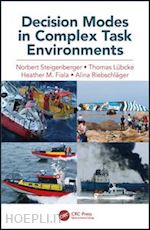Dr. Norbert Steigenberger is an Assistant Professor at Jönköping International Business School (Sweden). Previously, he held researcher and guest researcher positions at the University of Cologne (Germany) and Aalto University Helsinki (Finland). He studied Business Economics at the Technical University Freiberg (Germany) and the Universitetet i Tromsø (Norway) and received his doctorate from Chemnitz Technical University in 2011. His research primarily concerns different topics in management and organization, such as decision-making in organizations, mergers & acquisitions and novel forms of digital business. Thomas Lübcke is Head of Research and Development at the German Maritime Search and Rescue Service (DGzRS). He studied Sociology and Education at the University of Rostock (M.A.). His current research addresses organizational issues in complex maritime search and rescue operations, transdisciplinary research on human factors in safety critical domains as well as in the simulation and training of inter-organizational working contexts. As an active member, he is also involved in the platform "People in Complex Work Environments". Dr. Heather M. Fiala is a professional staff member of the Center for Controlling & Management at the Institute of Management Accounting and Control of the WHU – Otto Beisheim School of Management in Vallendar, Germany. She studied Psychology at Beloit College in Beloit, Wisconsin, USA (B.A.) and the University of Erfurt (M.Sc.). She completed her PhD in Psychology in 2013 at the University of Erfurt. From 2012 to 2015, she worked as a researcher at the Seminar for Business Administration, Corporate Development, and Organization at the University of Cologne, investigating decision-making in complex task environments. Alina Riebschläger studied Business Administration at the University of Cologne. From 2013 to 2015, she was a graduate assistant at the Seminar for Business Administration, Corporate Development, and Organization at the University of Cologne supporting a research project concerning decision-making in complex task environments.











